
With more than 70,000 Kiwis living with dementia, and this number expected to triple by 2050, it’s never been more important to have a high-quality and modern care environment for residents with memory loss. Given this, Village Guide has undertaken the analysis below of recent innovations for memory loss care within the nation’s retirement living industry.
From magic tables to sweet-smelling gardens: how innovation is thriving in New Zealand’s dementia care centres.
With more than 70,000 Kiwis living with dementia, and this number expected to triple by 2050, it’s never been more important to have a high-quality and modern care environment for residents with memory loss.
Given this, Village Guide has undertaken the analysis below of recent innovations for memory loss care within the nation’s retirement living industry.
The information has been supplied to us by retirement living operators, and will assist Village Guide readers when making decisions about care environments.
Outdoor areas and sensory gardens
Gardens are calming and beneficial environments for all of us, including residents living with dementia. There is growing evidence that gardens and outdoor areas help reduce the agitation and restlessness of people with memory loss, as well providing a location for easily-understood healthy physical activity.
As a result, an increasing number of memory loss care facilities in New Zealand are being designed so they easily integrate with outdoor areas.
For instance, Oceania’s Lady Allum Village in Auckland includes a sensory garden, which includes fragrant plants and typical natives found in most Kiwi gardens.
The outdoor area also has a walking track and design to take the resident on a journey of sight and smell, and can be used to stimulate conversation.
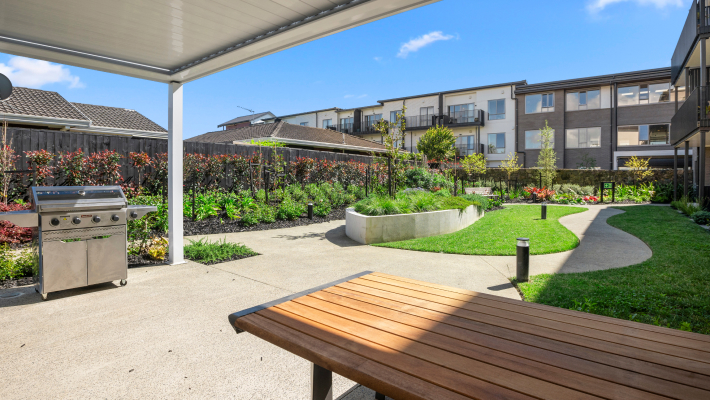
Sensory garden with walking track at Oceania’s Lady Allum village in Auckland.
The Lady Allum village is also designed to have a smooth transition between indoor and outdoor areas, including a washing line which allows residents to participate in a normal daily activity.
“The overall idea is that any activity is not just an activity but can be designed to enable the residents to find purpose and meaning in their day by participating in things that they consider normal,” an Oceania spokesperson said.
Meanwhile, Summerset says its memory care centres include secure courtyard gardens, which accommodate activities such as gardening, dining and relaxation.
Summerset currently has 10 memory care centres. On 1 July 2024, it opened its newest memory care centre at our Boulcott Village in Lower Hutt, and in the past year has also opened centres at Bell Block, New Plymouth (Summerset Pohutukawa Place), Pāpāmoa (Summerset by the Dunes), and Te Awa, Napier (Summerset Palms) villages.
St Johns Village in Auckland will open in November 2024.
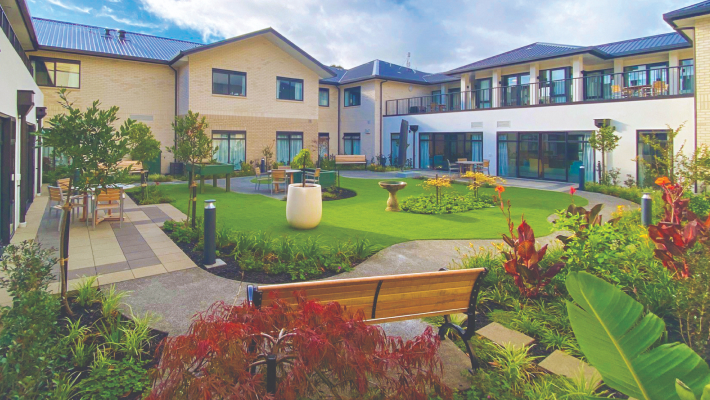
Memory care courtyard at Summerset on the Landing, Kenepuru.
In addition, 32 of the Ryman Healthcare’s villages offer specialist dementia care and all have dementia-friendly gardens.
“Nature is powerfully therapeutic for people with dementia," says Ryman’s dementia project specialist Caroline Bartle.
"Sadly, depression is common in dementia, but engaging in green exercise is known to improve mood. It gives people a sense of hope because it's about seeing things grow, and seeing the seasons change gives a structure and rhythm to life that memory robs. There is a spiritual connection with being outdoors.
"We put huge effort into creating sensory environments where people can feel the earth with their hands, hear the birds, enjoy the bright colours of the flowers, and rub some lavender and smell it, which may trigger memories for them. We have raised beds so that someone with mobility difficulties can participate in gardening."
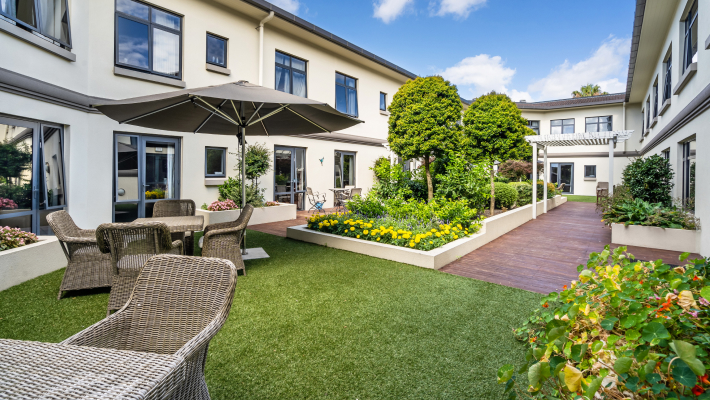
Garden in Ryman Healthcare’s Edmund Hillary Retirement Village in Auckland.
Innovative design
There is increasing evidence that the internal design of memory loss care facilities, and the way that residents are encouraged to interact with this design, plays a critical role in the health and well-being of residents.
For instance, Summerset’s memory loss care centres include unique features to help with wayfinding, including a circular design so residents cannot get lost, easily-recognisable signs, and calming colours and artwork. They also include guiding lights which assist residents with night orientation.
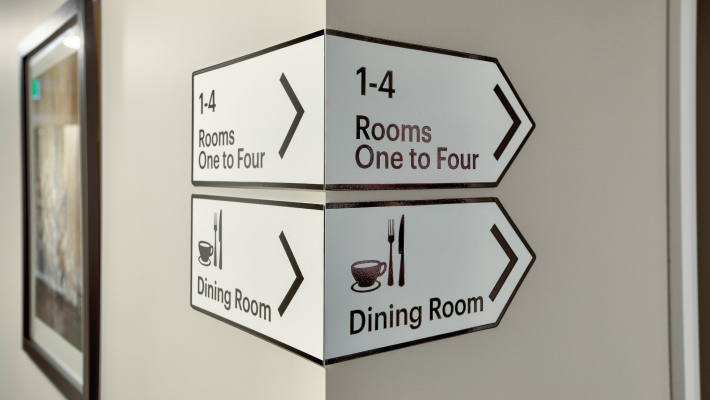
Easily-understood signage at Summerset on Cavendish at Casebrook in Christchurch.
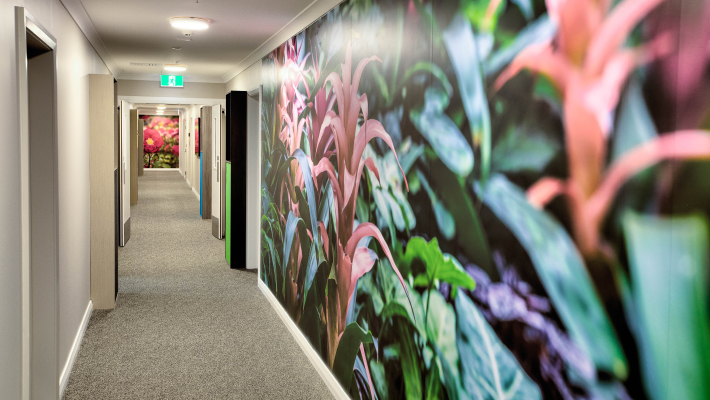
Calming colours and artworks at Summerset on Cavendish at Casebrook in Christchurch.
Similarly, Oceania says the Ruawai wing at its Lady Allum centre in Auckland has been designed to support dementia level care, including a simple carpet design to avoid resident confusion and misinterpretation, easy-to-read signage and visual cues, and contrasting colour on toilet seats.
The wing also has features to remind residents of a typical home environment, rather than make them feel like they are in a hospital or institution.
For instance, the wing contains a servery kitchen which allows residents to take part in cooking, such as baking and the preparation of food and vegetables. The vegetables can be grown in the sensory garden so that a more homelike routine can be simulated.
Main meals are of course prepared in a commercial kitchen, but the servery kitchen helps residents take part in meaningful activity.
In addition, the lounge windows have curtain tie backs - just like at home.
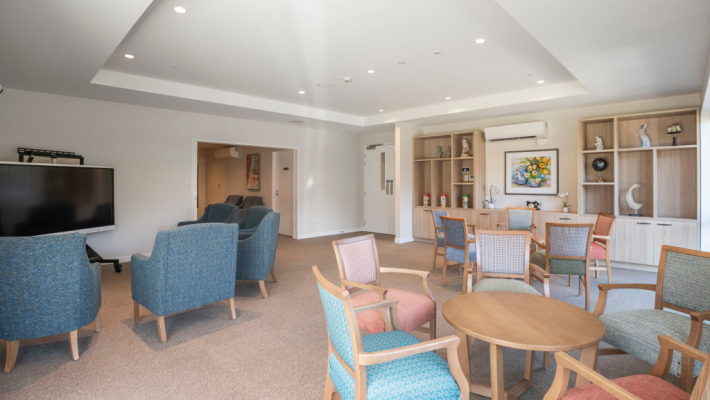
Interior of the Oceania’s Lady Allum facility.
Meanwhile, Metlifecare’s Weiti Care facility (which is part of the Gulf Rise Retirement Village in Auckland) is the first care facility in Aotearoa to achieve a 6 Green Star Design certification.
Showcasing what sustainability can look like in the context of a high-dependency residential unit, Weiti Care delivers on a range of challenges, from indoor environment quality, wellness and peacefulness to energy outcomes and life cycle impacts.
“International research has demonstrated that the use of natural materials, and timber in particular, can have a calming effect on occupants - enhancing wellbeing,” says Metlifecare's Head of Delivery, Michael Lisowski.
Everything you need to know.
Technology
Technology is playing an increasing role in the lives of memory loss patients.
For instance, Summerset’s memory loss care centres contain innovative and interactive sensory tables from the Netherlands. The machines are known as Tovertafel (or “Magic Table” in Dutch).
These tables are scientifically designed to help dementia residents enjoy fun cognitive stimulation, social activity and physical activity.
You can see a video of how the table works here.
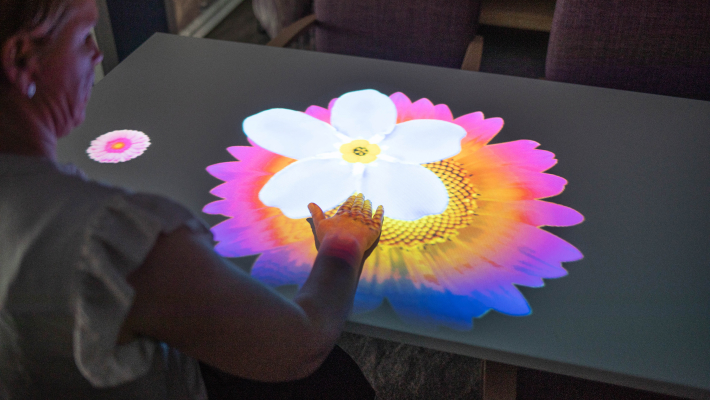
A resident uses a Tovertafel in a Summerset facility.
Summerset also uses a range of technology to monitor and assist residents. This technology is designed to be discreet so that it does not upset residents with alarms and other noises.
This includes bed and door frame sensors which discreetly notify staff of unexpected routine changes, along with night lights within apartments to guide residents to and from the bathroom. The system tracks each resident’s behavioural patterns and provides a customised program based on those patterns.
Personalised care plans
More aged care providers are delivering personalised care plans for residents with dementia.
Oceania says it has a person-centred care approach at its Lady Allum centre.
Oceania says its care will focus on promoting the essential psychological needs (taha hinengaro) of residents living with dementia - these are comfort (trust), attachment (security), inclusion (social connection), occupation (meaningful involvement) and identity (uniqueness).
Registered nurses and care associates also maintain open lines of communication with family (whānau) ensuring the residents’ life history and personal preferences are captured into a resident’s care plan.
Summerset also says it has personalised activity and care plans for each resident.
This includes supporting the resident to, as much as is possible, retain their skills and meet their own needs. It also involves developing personalised programs and activities designed by diversional therapists to cultivate cognitive skills.
“We use a Life Story approach working alongside the person and their family (whānau) to get to know our residents. This personal history is used to underpin our care plan and strategies to support the resident,” a Summerset spokesperson said.
Conclusion
If you’re helping someone with dementia, it pays to look around to make sure the care environment and cost suits the needs of yourself and your friend or loved one.
The best place to do this is Village Guide, which has a comprehensive listing of care facilities across the nation. Village Guide also has a very useful resource centre with handy tips and information to guide you during your search.


